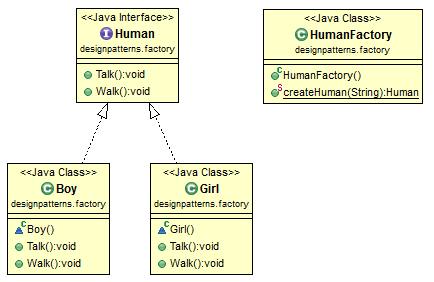1. The story for Factory pattern
Factory design pattern is used for creating an object based on different parameters. The example below is about creating human in a factory. If we ask the factory for a boy, the factory will produce a boy; if we ask for a girl, the factory will produce a girl. Based on different parameters, the factory produce different stuff.
2. Factory pattern class diagram
3. Factory pattern Java code
interface Human { public void Talk(); public void Walk(); } class Boy implements Human{ @Override public void Talk() { System.out.println("Boy is talking..."); } @Override public void Walk() { System.out.println("Boy is walking..."); } } class Girl implements Human{ @Override public void Talk() { System.out.println("Girl is talking..."); } @Override public void Walk() { System.out.println("Girl is walking..."); } } public class HumanFactory { public static Human createHuman(String m){ Human p = null; if(m.equals("boy")){ p = new Boy(); }else if(m.equals("girl")){ p = new Girl(); } return p; } } |
4. Factory design pattern used in Java standard library
Based on different parameter, getInstance() returns a different instance of Calendar.
java.util.Calendar - getInstance() java.util.Calendar - getInstance(TimeZone zone) java.util.Calendar - getInstance(Locale aLocale) java.util.Calendar - getInstance(TimeZone zone, Locale aLocale) java.text.NumberFormat - getInstance() java.text.NumberFormat - getInstance(Locale inLocale)
You can view the source code of Calendar and NumberFormat in javased.com.

Thanks for good explanation…..please go through this blog http://adnjavainterview.blogspot.in/2015/07/factory-design-pattern-in-java.html also explained good..
I don’t understand your question, can you be more specific?
corrected, thanks!
corrected. Thanks!
Glad to know the post is useful to you. Thanks for subscribing!
what about a more generic example, when you dont know the precise class
for instance if you got a list of classes that inherits a mother class ?
Nice example.
In HumanFactory for string comparison should m.equals(“boy”) / m.equals(“girl”) be used?
method’s name lower….
equals
lol. Java people.
Nice example, but when you compare String objects you should always use the equals method otherwise your factory object will always return null…
Good tutorial for this design pattern! I couldn’t find out some examples like this (easy and not confused haha) I’ll subscribe me to your newsletter. Good bye and greetings from Argentina !
Buen tutorial para este modelo de diseño! No pude encontrar algunos ejemplos como este (fácil y no confundir jaja) me voy a suscribirse a su boletÃn de noticias. Adiós y saludos desde Argentina!
typo mistake
class registration with or without reflection
it s very good but this procedural approach is not a good idea in OOPS. if we have 10 or 20 classes implemented the Human interface . crateHuman(String) by String will be unreadable. so in a standard way you can use class registration with or without to avoid if else check in factory. since java reflection affects the performance by 10% . you can go with class registration without reflection .
for example.
Load all the classes before registering into factory using Class.forName() in order for this to work .
Class.forName(“Boy”);
Class.forName(“Girl”);
interface Human {
public void Talk();
public void Walk();
public Human createHuman();
}
class Boy implements Human {
static {
HumanFactory.getInstance().registerHuman(“boy”,new Boy());
}
@Override
public Human createHuman() {
return new Boy();
}
@Override
public void Talk() {
System.out.println(“Boy is talking…”);
}
@Override
public void Walk() {
System.out.println(“Boy is walking…”);
}
}
class Girl implements Human{
static {
HumanFactory.getInstance().registerHuman(“girl”,new Girl());
}
@Override
public Human createHuman() {
return new Girl();
}
@Override
public void Talk() {
System.out.println(“Girl is talking…”);
}
@Override
public void Walk() {
System.out.println(“Girl is walking…”);
}
}
public class HumanFactory {
private static HumanFactory humanfactory;
private Hashtable humanGroup = new Hashtable();
public static HumanFactory getInstance() {
if (humanfactory == null) {
synchronized(HumanFactory.class) {
if (humanfactory == null) {
humanfactory = new HumanFactory();
}
}
}
return humanfactory;
}
public void registerHuman(String name,Human human) {
humanGroup.put(name,Human);
}
public Human createHuman(String m){
Human human = (Human)humanGroup.get(m);
return human.createHuman();
/*Human p = null;
if(m == “boy”){
p = new Boy();
}else if(m == “girl”){
p = new Girl();
}
return p;*/
}
}
very good
good
The method is repeat